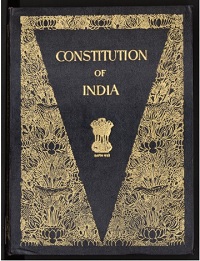Indian Polity Questions for Competitive Exams with Answers
Overview:
| Questions and Answers Type: | MCQs (Multiple Choice Questions). |
| Main Topic: | General Knowledge. |
| Sub-topic: | Indian Polity and Constitution. |
| Number of Questions: | 5 MCQs. |
In many competitive examinations in India, the Indian Polity and Constitution MCQs are asked, and here we are providing Indian Polity and Constitution MCQs with answers and an explanation. It is not just for students preparing for any exams, you can learn Indian Polity and Constitution for your general knowledge. This Indian Polity and Constitution Quiz section will definitely increase your GK about Indian Polity and Constitution and help you to prepare for your upcoming examinations.
Indian Constitution:

Directions: In the following Indian Polity and Constitution Quiz, four answers are given, and only one answer is correct. Please read the questions carefully and choose the correct answers. To check the answer, click on the answer button and know the correct answer with an explanation. We hope you will find this section of the Indian Polity and Constitution Quiz helpful to increase your knowledge.
1. Which article of the Constitution of India provides for an independent office of the Comptroller and Auditor General of India (CAG)?
- Article 148.
- Article 142.
- Article 174.
- Article 149.
Answer: (a) Article 148.
Solution: The Comptroller and Auditor General of India are the Constitutional Authority in India, established under Article 148 of the Constitution of India.
Solution: The Comptroller and Auditor General of India are the Constitutional Authority in India, established under Article 148 of the Constitution of India.
2. Which of the following provisions can be passed, with the simple majority of the Parliament?
- Removal of Chief justice of Supreme Court.
- Salaries and allowances of Members of Parliament.
- Fundamental Duties.
- Constitution of State Legislative Council.
Answer: (c) Fundamental Duties.
Solution: The constitution can be amended in three ways: Amendment by a simple majority of the parliament, Amendment by a special majority of parliament and Amendment by a special majority of the parliament and the ratification of half of the state legislatures. Other provisions that can be amended by a simple majority are Admission or establishment of new states, Abolition or creation of legislative council in the state, Quorum in parliament, Salaries and allowances of the members of parliament, Privileges of the parliament, Use of official language, Election of parliament and state legislatures.
Solution: The constitution can be amended in three ways: Amendment by a simple majority of the parliament, Amendment by a special majority of parliament and Amendment by a special majority of the parliament and the ratification of half of the state legislatures. Other provisions that can be amended by a simple majority are Admission or establishment of new states, Abolition or creation of legislative council in the state, Quorum in parliament, Salaries and allowances of the members of parliament, Privileges of the parliament, Use of official language, Election of parliament and state legislatures.
3. The 70th Amendment of the Indian Constitution has given two Union Territories the right to take part in the election of the President of India. They are:
- Delhi and Chandigarh.
- Chandigarh and Puducherry.
- Delhi and Puducherry.
- Delhi and Daman & Diu.
Answer: (c) Delhi and Puducherry.
Solution: The 70th amendment provides for the inclusion of members of the legislature of Puducherry and Delhi. So, in the 1992 election of President of India, the members of the Union Territories participated for the first time.
Solution: The 70th amendment provides for the inclusion of members of the legislature of Puducherry and Delhi. So, in the 1992 election of President of India, the members of the Union Territories participated for the first time.
4. Which of the following authorities has the power to declare an area as a disturbed area under the Armed Forces Special Power Act (AFSPA)?
- Supreme Court.
- Parliament.
- Prime Minister.
- Both the President and governor of a state.
Answer: (d) Both the President and governor of a state.
Solution: An area to be declared as a ‘disturbed area’, is conferred on the Governor of the state or the Administrator of the Union Territory or the Central Government.
Solution: An area to be declared as a ‘disturbed area’, is conferred on the Governor of the state or the Administrator of the Union Territory or the Central Government.
5. Which one of the following articles deals with the appointment of the Prime Minister and other ministers?
- Article 76.
- Article 85.
- Article 75.
- Article 78.
Answer: (c) Article 75.
Solution: Article 75(1) in The Constitution of India states that the Prime Minister shall be appointed by the President, and the other Ministers shall be appointed by the President on the advice of the Prime Minister.
Solution: Article 75(1) in The Constitution of India states that the Prime Minister shall be appointed by the President, and the other Ministers shall be appointed by the President on the advice of the Prime Minister.
General Knowledge Questions
Indian Polity and Constitution MCQs
Indian Polity and Constitution GK MCQs-1
Indian Polity and Constitution GK MCQs-2
Indian Polity and Constitution GK MCQs-3
Indian Polity and Constitution GK MCQs-4
Indian Polity and Constitution GK MCQs-5
Indian Polity and Constitution GK MCQs-6
Indian Polity and Constitution GK MCQs-7
Indian Polity and Constitution GK MCQs-8
Indian Polity and Constitution GK MCQs-9
Indian Polity and Constitution GK MCQs-10
Indian Polity and Constitution GK MCQs-11
Indian Polity and Constitution GK MCQs-12
Indian Polity and Constitution GK MCQs-13
Indian Polity and Constitution GK MCQs-14
Indian Polity and Constitution GK MCQs-15
Indian Polity and Constitution GK MCQs-16
Related Topics
Basic General Knowledge
Biology
Books and Authors
Chemistry
Famous Places
Indian Famous Personalities
Important Dates and Days
Indian Art & Culture
Indian Economy
Indian Environment and Biodiversity
Indian Geography
Indian Ancient History
Indian Medieval History
Indian Modern History
Indian Polity and Constitution
Indian Organizations
International Organizations
Physics
Physical Geography
Sports
World Geography